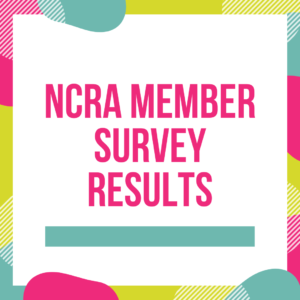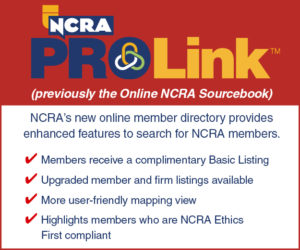 While flexibility and independence are strengths of freelancing, they also introduce complications. Managing personal business affairs while developing professionally and finding a balance between life and work can be challenging. Fortunately, these skills can get better with practice, and experienced court reporters are a great resource for business tips.
While flexibility and independence are strengths of freelancing, they also introduce complications. Managing personal business affairs while developing professionally and finding a balance between life and work can be challenging. Fortunately, these skills can get better with practice, and experienced court reporters are a great resource for business tips.
Marketing
For a freelancer, the best marketing strategy involves using a variety of cost-productive tools. The first step is to prepare the court reporter’s equivalent of a portfolio. “Prepare a professional one-page resume and be sure it is grammatically correct,” says Christine Phipps, RPR, a freelancer and firm owner from West Palm Beach, Fla. “Also list the writer you use along with the CAT software with version number,” she adds, so firm owners can see the reporter uses up-to-date, reliable technology. Phipps also suggests including a sample excerpt of an ASCII transcript of approximately 20 pages in length, removing any personal details or information that is confidential under HIPAA, along with the steno notes for that section. This portfolio can be emailed to firm owners so they have an idea of what to expect from potential new reporters.
Networking is an important part of a marketing strategy, as well as a great way to improve skills. “You want to make sure you network with other court reporters and firm owners at association events so that you can become known in your local market,” says Kim Neeson, RPR, CRR, CBC, CCP, a freelancer and firm owner from Toronto, Canada. “Participate on a committee of your local association, so people can get to see your competencies firsthand, even if it’s not as a court reporter per se.”
Having a personal connection to a network could also lead to more work. According to the 2014 Firm Owners Economic Benchmark Survey, about 56 percent of court reporting firms’ client base comes from other court reporting firms and colleagues, suggesting that freelancers should make connections to firms in their area even if they aren’t regularly accepting work from that firm.
Phipps agrees, adding that while conventions provide great learning opportunities, their value goes beyond the sessions: “Conventions are about surrounding yourself with people in the field and learning from them.” She emphasizes that volunteering for a local, state, or national association is also a great way to develop professionally. “I have met some amazing, wonderful, brilliant people who have taught me not to look at things in a vacuum. From this, I’ve learned so many tips and tricks that others do that I never could have learned anywhere else,” continues Phipps.
New connections, however, lose their value if they end with the initial conversation. Lisa Migliore Black, a freelancer and firm owner from Louisville, Ky., emphasizes that any marketing materials need to look professional. “It’s better to have no marketing materials than to have something that represents your company poorly or looks like it was thrown together,” she says. If you’re not comfortable with design, for either print or Web, it might be worthwhile to hire someone to help. Alternatively, think more creatively for marketing materials. For example, “many people may dispose of a business card or flyer, but few throw away a pen,” Black says.
Any marketing strategy should at least consider social media, although using social media should be done thoughtfully. For an individual, a social media account on a site like LinkedIn, Facebook, or Twitter might suffice, or it might be worthwhile setting up a website. But, as Black points out, then the trick is getting traffic to the site. Having a blog can help, says Black, because then there’s content for potential clients to read and to share on social media. But Phipps warns that even though many people use sites like Facebook for more personal reasons, anything that can be seen by the public needs to be professional.
Ultimately, however, the best marketing tactic is providing excellent client service. “Word-of-mouth referrals are more effective for bringing business to the door than any print ad or client testimonial on my website,” says Black. And when you find those clients, “underpromise and overdeliver,” Black advises. Neeson agrees: “The more agency clients request you for your work, the more you build up your business and value to those you serve.”
Finances
The key to managing business finances is organization. Keep records not just on expenses like meals, parking, and office supplies, but also track all income. “Many firms pay via direct deposit, and you are able to get your payroll sheets from within the online office program,” says Phipps. “You should download these and save for your records. I have seen firms that have cut reporters off from their online office access when the reporter no longer works for the firm, and then that information is no longer available.” Then use separate files – whether on the computer or in hard copy – to organize those documents into categories.
Because finances can be tricky, this is another area where it’s a good idea to invest in some help. Bookkeeping software like FreshBooks or QuickBooks can help with tracking income and expenses and, depending on the product, may also help with creating reports and determining quarterly taxes. Many of them include tools on mobile devices as well. An accountant can also help with bookkeeping.
The 2015 Freelancer Survey Report makes it clear that getting paid in a timely manner is a main concern for freelancers, but the situation depends on whether the money comes through a firm or directly from the clients. For freelancers accepting work by firms, it’s crucial to have a clear understanding of the firms’ policies. “If a new firm is contacting you to cover for them, I would do your best to check their references with friends or whatever connections you have available to you to make sure there are no payment issues,” says Phipps. “You should at least have an email confirming the firm’s policy for payment to reporters and what your responsibilities are. If the firm hasn’t paid in the specified time, contact the accounting department.” And, as with all legal issues, make sure to keep all conversations about payment in writing.
For freelancers who are acting as one-person firms and taking work directly from clients, have a payment timeline in place. Thirty days is a common threshold to send a reminder invoice, possibly with a late fee (although this should be clear in the original contract), and call the client to confirm they received the second invoice and understand that payment is expected. For long overdue accounts, the next step may be legal action, which could mean small claims court or a collection attorney. Again, keep a written record of the entire transaction.
Professionalism
The value in attending court reporting events cannot be understated. Conventions are not only a networking tool for marketing; they’re also important for professional development. In industries like court reporting, captioning, and legal video that are always changing, continuing education is crucial to remain a valuable professional, which is why NCRA credentials require continuing education and offers so many methods of earning those CEUs. Conferences and similar events are also great places to get one-on-one advice from colleagues. Interacting with other professionals provides the opportunity to find anything from a solution for a single problem or a long-term mentor and guide. This is especially important when it comes to staying on top of technology; conferences are a great place to meet with vendors and discover new products (or even a few new features) or to find tech-savvy colleagues who are happy to share knowledge, in person or via social media networks.
Events are not the only place to find professional development, however. The Internet can be a great place to find a network of like-minded professionals or resources. The U.S. Small Business Administration offers dozens of articles about starting and running a small business, which is essentially what freelancers are doing. The SBA recommends, for example, freelancers give themselves a regular review just as they would get if they were in a more traditional office. Consider setting specific professional goals throughout the year and using personal reviews to track them. Feedback from clients and firms, which sometimes need to be solicited, can help with developing specific goals.
Work/life balance
One of the trickiest aspects of being a freelancer is finding a balance between professional and personal responsibilities. Unlike other areas like marketing or finances, which have more general tricks, finding the right balance comes down to what works for the individual. First and foremost, set boundaries. “Know how long it takes you to scope and proofread work,” says Phipps. “You should know your limits and be clear with the firms you’re working with on the maximum amount of pages you can take in a week.” And be sure to schedule breaks, both large and small. For large depositions, Black sets a daily page goal and small percentage goals through the day and takes short breaks in between. She also suggests using a tablet to proofread so she can do so while sitting outside or eating a meal. And don’t underestimate the value of a longer break when necessary. “I gave up too many vacations only to realize that it’s just as important to recharge as it is to be present at work,” Neeson says.
Even though proofreading takes time, there are a few ways to make the task more manageable. At the basic level, write clean and know your software. “I made it my mission to always try to write as clean as possible and thereby reduce my scoping and proofreading time,” says Neeson. Black suggests using dead time during the day to scope and proofread. “The biggest efficiency is editing while I’m taking down live testimony. Every correction I make from my writer or on my realtime screen saves me valuable time later.” The right software can make these tasks easier too. Phipps suggests using Connection Magic because then reporters “can invite a scopist into their file to scope and the court reporter can simultaneously proofread at the same time.” Black makes sure to bring a touchscreen laptop on jobs to quick tap the screen and add missing punctuation on-the-job. She also suggests taking advantage of software training sessions, either one-on-one or in a group setting.
In many ways, however, finding a balance comes down to finding help when necessary, whether this is using a trusted scopist or proofreader, delegating household tasks to other family members or to a cleaning service, finding service professionals who are flexible about accommodating last-minute appointments, or prioritizing daily events, like making sure to eat dinner as a family. For freelancers with children, however, sometimes the biggest hurdle to finding a balance is to not feel guilty about missing things here and there.
The same things that make freelancing challenging can also be advantages. Having personal responsibility over marketing and finances also means having a measure of control. This is especially true in marketing since word of mouth still prevails, even in the digital age, and freelancers definitely have control over the quality of their customer service. Some of the same tactics that can increase business development can also help with individual professional development, especially by attending local, state, or national conferences. And while achieving a true balance between work and life is tricky, having a more flexible schedule can help shift responsibilities around when something comes up. The biggest tip for a freelancer, however, is to stay active in a network of like-minded colleagues to continue to share information and support with each other.
Megan Rogers is NCRA’s Communications Assurance Specialist. She can be reached at mrogers@ncra.org.














